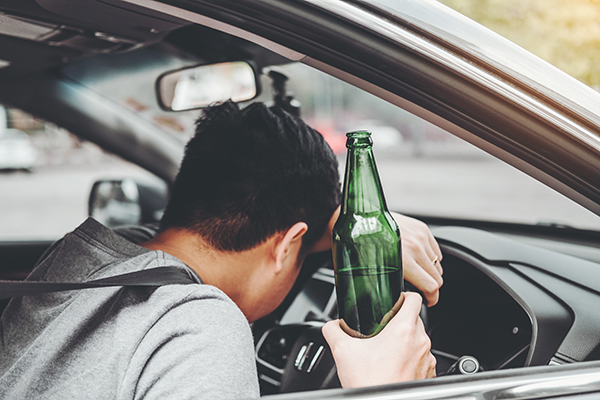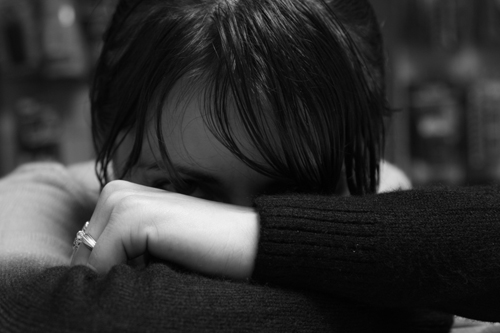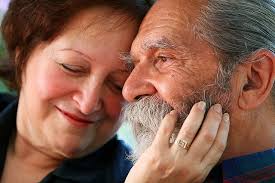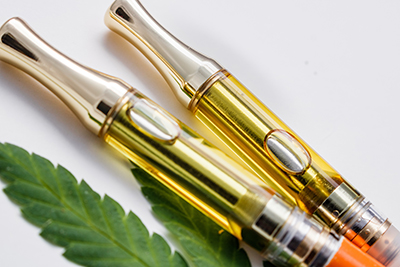Drunk Driving and DUI:
The Legal and Emotional Consequences
Posted on May 27, 2020
Alcohol/Drug Treatment in Jail

Now retired after seventeen years of chemical dependency counseling for Seattle King County Public Health, I approach the topic of drunk driving from the perspective of my work with inmates who have been sent to jail in Seattle for driving under the influence. Some inmates had all ready been convicted for their DUI, while others--pending trial and sentencing--remained in jail awaiting trial because they couldn't make bail.
Participation in our chemical dependency counseling program was voluntary. Some inmates participated out of a genuine heart-felt desire to get sober and start a new sober life. Others wanted to be able to show the judge evidence of their participation, in hopes of getting an early release from jail. Many were motivated by both considerations.
The clients who entered my group room, would always see the words, "Fear of jail is the beginning of wisdom" printed across the top of my black board. The sentence was there to stimulate thought and trigger interesting discussions. I would ask a client, "What does that mean to you?" Often his response would begin, "Well, I'm not afraid of jail." Most often, he meant that he was not afraid of the jail environment--the guards or other inmates. I wanted to look a little further at what there was to be afraid of.
"How has being incarcerated affected your life? What has it cost you to be locked up?" I would start a list on the backboard.
"Freedom" was a common response. And this most often referred to lack of freedom of movement and freedom of choice. It also included living each day by rules that others established and that often seemed to change as shifts changed and new guards came on duty.
Of course such issues as attorney's fees, court costs and fines, victim restitution costs, and lost wages would be mentioned.
Sooner or later, the discussion would turn to other losses. When someone spends a year in jail, they are not working and earning a salary. Without money to pay bills they lose their apartments and often all the personal possessions stored there. During their incarceration, inmates have cars repossessed and their homes foreclosed on. Wives and children may end up homeless, go on public assistance, or file for divorce. Locked inside jail, the inmates are terribly upset and angry but unable to help their families.
While my clients included inmates with all kinds of addiction problems and legal charges, the alcoholics most often had only broken only two kinds of laws--driving under the influence (a DUI) or "physical control" and/or driving while license suspended (DWLS).
Often these were pleasant, intelligent men who thought of themselves as good workers and were proud of their work history and their ability to provide for their families. Many had jobs waiting and employers eager to have them back at work.
Once incarcerated and sober, many were wracked with shame and guilt, worried about their families--particularly their children. Knowing the difficulties their families faced because of their incarceration was a heavy burden.
I told my clients, "Part of the recovery process is asking yourself the question, 'How have others (such as the judge, the jail guard, or probation officer) gained control of your life?'"
Common responses are, "Drinking and driving," or "breaking the law." Others answer, "Every time I use alcohol I get into trouble and end up in jail!"
The important issue is whether the offenders are able to take responsibility for their own actions and to recognize that jail is the result of their own wrong choices.
More Treatment Opportunities are Needed "Inside."
Please Note: Alcohol and drug treatment in a jail or prison setting is fairly rare and becoming more so as state and local governments are faced with severe budget deficits and are trimming all non-essential expenses. North Rehab Facility (NRF), the best program I have ever seen, was closed because there was just no money to keep it open. However, as the economy picks up and more revenue is available, I sincerely hope that these treatment programs are reinstituted. Incarcerated alcoholics and addicts need help to break the cycle of relapse and re-incarceration and find their place once again among law abiding, tax paying citizens.
Whose problem is it?
I remember one morning in the summer when we were in the group room. This one fellow--let's call him Frank--was setting at the far end of the table talking about a complex history of problems. Going to jail for his third DUI had caused him to loose his business, his vehicles, his home and his wife and children to go on Aid to Dependent Children (commonly referred to as public assistance).
When he finished listing his problems, I asked, "Frank is it possible you have a problem with alcohol?"
He screwed up his face in anger. As he spoke he slammed his right fist into his open left hand to emphasize his points. He spoke with such force, contempt and vehemence that all of us were startled. "I DON'T have a problem with alcohol! The god damned COP has a problem with alcohol! The god damned PROSECUTOR has a problem with alcohol! The god damned JUDGE has a problem with alcohol! But I don't have a problem with alcohol!
It was very quiet for a few moments. All of us knew--except possibly Frank--whose problem it was. And we all knew that until Frank accepted personal responsibility for his problem, nothing would change. Nothing would get better.
If nothing changed, Frank would be back.
I turned to the members of the group and asked, "What stage of recovery is Frank in?"
Someone responded, "Pre-contemplation."
"How do we know?" I asked.
"Because he doesn't think he has a problem," several in the group responded. And the group discussion continued.
Authors note: The Stages of Change Model of addiction recovery was originally developed in the late 1970's and early 1980's by James Prochaska and Carlo DiClemente at the University of Rhode Island when they were studying how smokers were able to give up their habits or addiction.
My clients were expected to learn to recognize what "stage of change" both themselves and others in the group were in--by their words and behaviors--in and out of the group setting.
The Stages are:
First Stage: Precontemplation--Not ready to change
Second State: Contemplation--Thinking about change
Third Stage: Preparation--Getting ready to make a change, planning and commitment.
Fourth Sage: Action--Making the change, implementing the plan, taking the action.
Fifth Stage: Maintenance--Sustaining behavior change until integrated into lifestyle
Sixth Stage: Relapse/recycling--Slipping back to previous behavior and re-entering the cycle of change.
Seventh Stage: Termination--Leaving the cycle of change.
Suspension of Your Drivers License
One of the penalties for conviction of driving under the influence is the suspension of one's driver's license. In Washington State, this is automatic and is actually imposed by the Department of Licensing (DOL) in Olympia, our capitol. Suspension periods usually start at 90 days and increase to a year with repeated offenses.
In Washington, driver's licenses can also be suspended for other causes at court request, such as for failure to pay parking fines or child support. Reinstatement requires demonstration of financial responsibility.
However, when suspension is for drunk driving, the DOL will also request that the offender go to a state licensed chemical dependency treatment provider facility for an alcohol assessment. The findings or diagnosis will determine what chemical dependency treatment the offender must undergo to regain his license.
DUI offenders who are assessed as alcoholics or addicts will be required to complete a two year outpatient chemical dependency treatment program at a state approved facility. When the suspension period is up and the offenders present evidence that s/he has completed at least their first 60 days of treatment, they are eligible to receive a provisional drivers license and can retain it and continue to drive legally so long as they remain sober and successfully continue in treatment.
Physical Control of a Vehicle
Most people don't know it until they get a ticket for "physical control of a vehicle while intoxicated," but you can get the equivalent of a DUI without driving drunk.
I have worked with incarcerated clients who had ended up in jail for getting drunk and deciding to sleep in their cars. Others have gotten physical control tickets when they parked their cars on the shoulder and walked away from them.
The client who was drunk and sleeping in his car was awakened by a policeman tapping on the window. Questioned and asked to do a field sobriety test, he was obviously intoxicated and impaired. The policeman then asked him to take a breathalyzer test and he refused. He was given a physical control ticket, arrested, jailed and convicted--in that order.
The client, who realized he was too drunk to drive, parked his car and was walking away from it when stopped by the police. Failing a field sobriety test and a breathalyzer test, he was arrested, jailed, released on bail, tried and convicted and sentenced to jail.
The idea of the physical control ticket seems to be to stop and detain drivers on public roads who are drunk and still in physical control of a motor vehicle because they constitute a treat to public safety. For all purposes, the penalties for physical control and for driving drunk are exactly the same.
Refusing to Take a Breathalyzer Test
If you are stopped by the police for driving drunk, you face a quandary. Under the drunk driving laws in Washington state (and many states), a license to drive is legally defined as a privilege, not a right. Refusing to take a breathalyzer--when an officer asks you to take one--results in an automatic one year suspension of your driver’s license.
You think, "I've had a lot to drink. I'm probably drunk. Why should I take the breathalyzer test and give them the proof they need to convict me? I'm not going to take it."
However, once you have refused that breathalyzer test, even if you are found innocent of drunk driving or physical control, your driver’s license will be automatically suspended for one year. If you are found guilty of a first offense, you drivers license will be suspended for a minimum of 90 days PLUS the automatic one year suspension for refusing to take a breathalyzer test.
DWLS (Driving While License Suspended)
Paul says, "No, I can get rides from my girl friend and my sister. Other times I'll ride the bus. I've had a lot of experience riding the bus."
Henry smiles, "I probably shouldn't admit it, but I'm going to drive. I work in construction and the jobs are all over. I live way out in the sticks and there are only two buses a day. I have to drive or I can't work. If I take my time and obey the speed limit, I won't get caught."
DWLS Penalties
In my jailhouse treatment groups it was not unusual to have addicts and alcoholics who had been jailed several times for driving without a license. But we were all shocked one summer day when George revealed that he had been arrested for driving without a license 86 times.
"Things have changed. A DWLS charge used to get me a slap on the wrist," George said. "But this time the judge just looked at my record, said 'One year in jail' and that was that. I think I'm going to have to get a license or I'm going to spend the rest of my life in jail."
Is it DUI (Driving Under the Influence) or DWI (Driving While Intoxicated)?
If you are arrested for drunk driving, whether you get a DUI or a DWI depends on the laws of the state in which the offense occurs. Alcohol blood levels required for legal intoxication vary from state to state as do the legal penalties for drunk driving. In some places you can be charged with DUI if you haven't had anything to drink but your driving is impaired by your use of any drug--legal or illegal, prescribed or over-the-counter. (Check with an attorney.)
Alcohol Screening Test
Disclaimer : Please note that the contents of this page are based on the counseling experiences of this Washington state author and do not constitute legal advice. As this page indicates repeatedly, if you are arrested for drunk driving (DUI or DWI), physical control or driving while license suspended (DWLS), it can have serious legal, employment, financial and family consequences. Please consult an attorney who specializes in these issues.
You or family members may also want to consult with a local mental health counselor to help deal with some of the emotional trauma of arrest, trial, incarceration, probation, alcohol/drug assessment, chemical dependency treatment, financial expenditures and related matters.
DUI Counseling
Patrick, an alcohol and drug counselor and an associate of mine in Seattle Counselors Association, specializes in something called Drunk Driving (DUI) Arrest Crisis Management Counseling (what a mouthful!). When Sarah (one of my relatives) got her DUI, her husband called me for advice. I referred him to Patrick, who helped Sarah get through those trying times. Now, much later, I see Sarah often at family functions and she is happy, healthy, clean & sober.
Patrick is frequently contacted by mothers and fathers, husbands or wives to do alcohol, drug and/or psychiatric interventions. An "intervention" is a delicate process--often involving participation of family, employer, and friends--to get the person with the problem to finally acknowledge the problem and agree to treatment.
Other times it is the arrested driver who later calls Patrick. A DUI arrest--with handcuffs, a ride in the police car, being booked into jail and perhaps spending a night or two as a prisoner in jail--can trigger a lot of shame and guilt. In addition, the offender is facing a district court trial and the prospect of additional jail time. Besides having a good DUI attorney, it's a great time to have a knowledgeable and experienced counselor to help you deal with the emotional side of a traumatic event, to steer you to the treatment you need and help you deal with a complicated physical, mental, emotional and legal process.
When Do You Go to Jail, and When Do You Go to Prison?
Bob's DUIs
The common explanation that I had always heard was that if you were sentenced to a year or less you went to jail. If you were sentenced to more than one year (a year and a day) you would go to prison.
Imagine my surprise when Bob showed up in one of my groups. As Bob explained to my inmate treatment group, he had piled up four DUIs over a 3 year period. One the first DUI he was found guilty and sentenced to a year 365 days) in jail--with all but one day suspended on condition that he attend and complete an alcohol treatment program. [Upon notice of his conviction, the Department of Licensing had notified him that his driver’s license was suspended for 90 days.]
A fairly short time after his first conviction, he got his second DUI. He was convicted of DUI and sentenced to one year in jail with all but one week suspended on condition that he attend and complete an alcohol treatment program. (Now, I've not including everything--there were also fines and court costs and other expenses--but I'm trying to keep the story simple.)
By then he had finally started in an alcohol treatment program. But he wasn't really taking it seriously. He continued to drink on the sly until [surprise!] he received his third DUI arrest. Bob asked the court for a deferred prosecution and the court Okayed it. Under the terms of the deferred prosecution, he admitted his guilt and that he was alcoholic and in need of treatment. The court agreed not to take him to trial and to drop the charges completely, if he successfully completed a two year treatment program.
Fortunately for him, these DUI arrests were all occurring in different court jurisdictions in different counties. The new DUIs apparently did not come to the attention of the two previous judges and they did not revoke his suspended sentences. Well Bob was still not ready to admit that he had a serious problem with alcohol. He continued in treatment, still sneaking drinks. Once again he was arrested for a DUI. This time all hell broke loose!
The first judge revoked his suspended sentence and sentenced him to 364 days in jail--the balance remaining on his first sentence.
The second judge revoked his suspended sentence and sentenced him to 358 days in jail--the balance remaining on his second sentence.
The third judge vacated Bob's deferred prosecution and sentenced him to serve 365 days in jail.
The forth judge found Bob guilty of DUI number four and sentenced him to serve 365 days in jail.
Of course Bob would get time off his sentence for good behavior, but basically he was suddenly in jail serving what amounted to a four year sentence!
I met Bob near the end of his third year of incarceration when he enrolled in the jail's chemical dependency treatment program. He had come to recognize that he could not control his alcohol use. He was really serious about staying sober, working on his recovery, and staying out of jail.
Wynn's DUIs
Wynn was a quiet, polite, short man in his mid-thirties. He was in the minimum security jail, participating in our "Stages of Change" treatment program when he shared his story.
"The DUI that I am here for now was my third DUI. I plead guilty to the DUI and was sentenced to a year in jail. There won't be any court review for a possible early release--the judge doesn't want to see me in his court again.
"When I started drinking it was a lot of fun with friends. I enjoyed being drunk, having a good time. I drove my car under the influence lots of times before I got my first DUI arrest. It was a few weeks after my 22nd birthday.
"I was found guilty of a DUI, sentenced to have an alcohol evaluation, spend 365 days in jail--with all of it suspended except for the 63 days I had already spent in jail. It was a rude awakening. I had my alcohol evaluation. The counselor told me I was an alcoholic. I really didn't understand what that was, but I found out a lot about it as I went through chemical dependency treatment. I had really lost control of my drinking. It was like I couldn't have fun anymore without drinking.
"I worked and paid court costs and fines and for my chemical dependency treatment. I went to Alcoholics Anonymous meetings and I didn't drink. I started to feel better and to have more energy. But I never liked treatment or AA groups. As soon as my two years was up and my business with the court was finished, I stopped going to AA.
"After about two years of sobriety, I relapsed. I just had a drink or two once in a while. Then I started going out drinking with my uncle. Even though he was my Uncle George, he was the baby of his family and was only two years older than me. But I still called him Uncle.
"One night Uncle George and I went out drinking. I was driving us from one place to the next. Finally I was ready to call it a night and go home. Uncle George wanted to go to one last bar, so I headed that way. "Somehow I lost control of the car on a curve and hit a tree. Uncle George was killed. My leg was broken, several ribs were broken, my jaw was broken...I can't remember everything that was broken or busted. Anyway, I was in the hospital a long time; then I went to jail.
"They charged me with vehicular homicide because I was driving drunk and caused my uncle's death. I was convicted and sentenced to ten years in prison. I served seven years and then I was released.
"I can't tell you how bad I feel about my uncle dying. He was my favorite person. Some of my family are still angry with me and avoid talking to me.
"About four months after I got out of prison I started drinking again. I got another DUI arrest and the judge sentenced me to a year in jail. That's how I got here this time.
"I signed up for treatment because I realize that alcohol is a problem for me. I can't learn to control my drinking. I just need to stop drinking for good. But everybody I know drinks. I'm going to have to find some new friends that don't drink and learn to have fun without drinking. I don't want to come back to jail anymore."
Author's note: However, because of the slow progression of alcoholism (moving from early to late stage alcoholism may take 20 years) Wynn has spent all his adult life using alcohol in social situations. He will tend to feel uncomfortable in any social situations in which he does not drink. He may end up relapsing out of loneliness. It is in this period of early recovery that participation in the social aspects of Alcoholics Anonymous and other 12-Step organizations is so important. Persons in recovery can bowl; play soft-ball, dance and picnic in the company of other recovering men and women.
Victims' Panels
DUI convictions often include a sentencing requirement to attend a "victim's panel." The offender pays a fee and attends a scheduled victim impact panel where s/he views a presentation by victims of drunk drivers who share their personal stories.
Vehicle Impounding and Towing
Washington State started enforcing new DUI standards in 1999, enforcing one of the strictest DUI laws in the country by lowering the legal blood alcohol limit to .08 from .10. The new DUI laws work hand in hand with the "Driving While License Suspended" (DWLS) Impound Law that automatically authorizes the towing of vehicles whenever suspended drivers are stopped.
I Can't Stop Drinking
When a man or woman says, "I can't stop drinking," don't disagree with them. Ask, "What do you mean?" Listen to what the person has to say. It may be that those words signal the person's recognition of a serious problem and the need for help. That is the point to help someone get into treatment.
For the intoxicated heavy drinker, the first step is to get into a medical detoxification unit. Alcohol withdrawal can be life threatening and lead to sudden cardiac arrest or respiratory arrest. Medical supervision is important.
During the time in detox, arrangements can be made to get into treatment. Payment for treatment can be a problem. Some have insurance, some qualify for increasingly under-funded state ADATSA treatment, and other may need to get into free treatment program such as those offered by the Salvation Army.
The important thing is to get into the safe (alcohol free) environment of a treatment program. In this inpatient or intensive outpatient treatment environment the person has the support of staff and others in recovery. Treatment programs gradually become less intense as weeks pass and the person spends more time in the community, learning to cope with life without using alcohol.
Because people who have been using alcohol heavily for years have gradually pushed away the people and activities that do not involve alcohol use, their only remaining friends and associates tend to be alcoholics and activities that include alcohol. In recovery, the person needs to give up these old friends and activities and learn to form new friendships and to participate in and enjoy clean and sober activities.
Imagine that you were faced with this task today. You must give up all your current friends and all the activities that you are used to. You must start forming new associations and friendships and participating in different activities that you aren't used to. This can be scary and very difficult. It is the point at which many people relapse.
Oxford House (and many other community organizations) has done a tremendous job of providing clean and sober housing for people in recovery. Alcoholics Anonymous, once the only option for persons seeking sobriety, is still helping people in recovery. I have always urged my clients to participate in AA activities, whether they liked AA meetings or not. Alcoholics Anonymous sponsors all kinds of healthy, fun clean-and-sober activities: bowling, dances, camping trips, softball leagues, etc. to help the person in recovery overcome loneliness and be active with people who understand, accept and support their recovery.
"I can't stop drinking," does not mean the person is helpless. It doesn't mean that some other family member is supposed to "fix them." Friends and family members should not try to deny the problem or minimize it. "I can't stop drinking," means they recognize a problem and need professional help. Encourage them get it.
Visit the official Washington State Department of Licensing site for an explanation of drunk driving laws.
Sleep Disturbances
Alcoholics generally have dysfunctional sleep patterns, even during abstinence from alcohol. New findings suggest that acamprosate shows promise as a treatment method for alleviating sleep disturbances experienced by alcoholics during abstinence.
This document is Copyrighted 2012 by Floyd Else, MA, PO Box 6714, Bellevue, WA 98008. All rights reserved. Portions may be quoted so long as the author, Floyd Else, and the source, Counseling Washington and CounselingSeattle.com, are identified.
SEE ALSO:
More Mental Health Articles
Sexual Bias Articles
Race Relations Articles
How Drugs and Alcohol Affect the Brain and Body
WA. Counselor Directory: find a therapist near you
How helpful is this web page to you?
(and how can we can improve this page for you?)
not helpful
very helpful
Other Articles
What is Domestic Violence?
What is the Crime of Domestic Violence in Washington State? Definitions (C) (3) "Domestic violence" means: (a) Physical harm, bodily injury, assault, or the... read more
Who is Most Qualified to Treat Sexual Problems?
Sexual issues are addressed by a variety of therapists, but the American Association of Sex Educators, Counselors and Therapists (AASECT) certified sex therapists and counselors are the most quali... read more
Losing Your Hair Can Be Another Consequence of the Pandemic
Doctors are seeing a huge increase in patients who have been shedding abnormal amounts of hair, and they believe it is related to stress associated with the coronavirus.
Annrene Rowe was getting ready to celebrate her 10th wedding anniversary this summer when she noticed a bald spot on her scalp. In the following days, her thick shoulder-length hair started falling out in cl... read more
Officials list pot vape brands reported in US outbreak
NEW YORK (AP) — Health officials investigating a nationwide outbreak of vaping illnesses have listed, for the first time, the vape brands most commonly linked to hospitalizations. Most of the... read more




